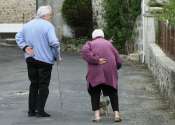Survey uncovers further aggravation of home care for older persons during the COVID-19 pandemic
The COVID-19 pandemic places a particular focus on older persons. Therefore, it comes as a surprise that the high-risk group of around 2.6 million care-dependent older persons in Germany who receive care at home, predominantly ...
Jul 21, 2020
0
1






